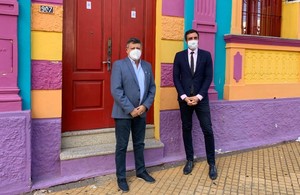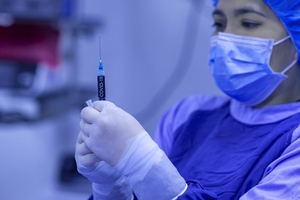Mr Deputy Speaker, I am honoured to have been asked to become Secretary of State for Health and Social Care.
I understand the responsibility that comes with this job, especially at this critical moment.
As someone who has sat on these front benches for many years, this past year has been a difficult one.
I’ve been frustrated not to be able to play my part in helping to meet the greatest public health challenge our country has ever faced.
I’m especially proud, Mr Deputy Speaker, to have been given this opportunity for public service.
Nothing embodies the spirit of public service more than our National Health Service and those who work in our social care.
I’ve seen it myself in my constituency in Bromsgrove – and I saw it again just this morning at St Thomas’ Hospital where I met doctors, nurses and volunteers who have moved such mountains this past year.
Now they’re helping us vaccinate our way out of this pandemic.
I pay tribute to them all, and I pledge to do everything I can to deliver for them, and the people of this great country and I look forward to working with colleagues on all sides of the House, as we work together on that vital mission.
We are making phenomenal progress with our vaccination programme.
Vaccination is now open to every adult in the country: 84% of adults have got a jab and 61% of adults have had 2 doses.
This progress has allowed us to safely take those first 3 steps out of lockdown – and on towards greater freedoms we enjoy today.
We owe this strong position, not only to the NHS, but everyone that has played their part.
I want to take this opportunity also to pay tribute to my predecessor, my RHF the Member for West Suffolk, who had worked hard through these testing times.
He achieved a great amount in the work that he did, and I know he will have more to offer in public life. I wish him all the very best.
Mr Deputy Speaker, there remains a big task ahead of us: to restore our freedoms, freedoms that, save for the greatest of circumstances, no government should ever wish to curtail.
So my task is to help return the economic and cultural life that makes this country so great – while of course protecting life and our NHS.
That task has been made all the more difficult by the Delta variant, which we now know makes up 95% of new cases in the UK.
Not only does it spread more easily, but the evidence points to a higher risk of those who have not been vaccinated needing hospital treatment – compared to the previously dominant Alpha variant.
This narrowing of the race between the virus and the vaccine led to this government’s difficult decision to pause step 4 on our roadmap until 19 July.
We’re using this extra time to protect as many people as we can.
When the government took that decision on June 14, over 4.3 million over 40s had had a first dose but not a second.
That’s now down to 3.2 million people over 40.
We can all be assured by how many more people are getting the life-saving opportunity that a vaccine offers.
So Mr Deputy Speaker, at this 2-week review point, I want to update the House on our progress to our roadmap to freedom.
Mr Deputy Speaker, our aim is that around two-thirds of all adults in this country will have had both doses by 19 July.
We’re bringing forward second doses, and bringing forward our target for first doses too, so we can meet that 19 July goal.
Vaccine uptake remains sky high.
We’ve seen that age is no barrier for enthusiasm for getting the jab.
As of this weekend, more than half of adults under 30 have taken up the chance to be vaccinated – including, in the last couple of weeks, all 3 of my own adult children.
And our vaccines are working – including against the Delta variant.
The latest modelling from Public Health England shows they have saved over 27,000 [27,243] lives and have prevented over 7 million people from getting COVID-19.
We do know that after a single dose of vaccine the effectiveness is lower against this new Delta variant at around a 33% reduction in symptomatic disease.
But 2 doses of the vaccine are just as effective against hospital admission with the Delta variant, compared to the Alpha variant.
The jabs are making a difference in our hospitals too.
In January, people over 65 who were vaccinated earlier in our programme made up the vast majority of hospital admissions.
The latest data show that group now makes up less than a third.
While cases are now are ticking up, the number of deaths remains mercifully low – and we’ll continue to investigate how our vaccines are breaking that link between cases, hospitalisations and deaths.
And I’m encouraged by new data just today from Oxford University’s ‘mix and match’ trial which show that a mixed schedule of jabs – such as getting the AstraZeneca jab first then Pfizer second – could give our booster vaccination programme more flexibility – and possibly even some better immune responses.
Finally Mr Deputy Speaker, we continue to see a rise in hospitalisations – although in line with the kinds of numbers we had anticipated at this point on our roadmap.
The number of people needing hospital treatment for COVID-19 has doubled since the start of May.
Admissions are most clearly increasing in the North East and South West of England so we’ve been boosting testing centres and vaccines in those areas and keeping a close watch on the numbers.
I spent my first day as Health Secretary just yesterday looking at the data and testing it to the limit.
And whilst we decided not be bring forward step 4, we see no reason to go beyond 19 July.
Because in truth: no date we choose comes with zero-risk for COVID.
We know we cannot simply eliminate it – we have to learn to live with it.
We also know that people and businesses need certainty. So we want every step to be irreversible.
And make no mistake, Mr Deputy Speaker: the restrictions to our freedoms must come to an end.
We owe it to the British people, who have sacrificed so much, to restore their freedoms as quickly as we possibly can – and not to wait a moment longer than we need to.
So Mr Deputy Speaker, with the numbers heading the right direction — all while we protect more and more people each day – 19 July remains our target date.
The Prime Minister has called it our ‘terminus date’.
For me, the 19 July is not only the end of the line but the start of an exciting new journey for our country.
So Mr Deputy Speaker: at this crucial moment in our fightback against this pandemic, we must keep our resolve and keep on our roadmap to freedom – so, together, we can beat this pandemic and we can build back better.
It is a task I’m deeply honoured to lead – and one I know will succeed.
I commend this statement to the House.


